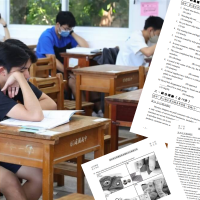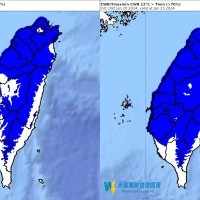TAICHUNG (Taiwan News) — The vote is in and voters showed their discontent with all political parties big and small, giving none of them what they desired, but discontent did not translate into disinterest as 71.86% of eligible voters turned out.
In their post-election speeches, Lai Ching-te (賴清德) and his supporters on stage were all beaming, Hou Yu-ih’s (侯友宜) stage looked like a funeral wake but Ko Wen-je (柯文哲) looked fairly chipper. In reality, this election had good news and bad news for all three parties.
Lai won the presidency, breaking the “eight-year administration curse” (8年執政魔咒) of parties never holding on to power for more than two successive terms. However, winning with only 40.1% of the vote means more people wanted someone else in office.
His Democratic Progressive Party (DPP) got mauled in legislative races north of the Zhuoshui River, losing seats from Taichung on up. This reverses many of the inroads it had been making outside of its southern Taiwan strongholds in 2016 and 2020, suggesting that it had not managed to set deep roots in the north.
The party lost its legislative majority as well as losing its status as the largest party, dropping to 51 seats in the 113-seat body. This will make it harder to get their agenda through, a situation faced by the DPP’s first president Chen Shui-bian (陳水扁) from 2000 through 2008. Chen also won in 2000 in a three-way race with only 39.3% of the vote.
Mixed news for KMT
Similarly, the Kuomintang (KMT) got mixed news. They lost the presidential race by a large enough margin for it to hurt.
They did pick up 52 seats and are now the largest party in the legislature, though still short of the 57 needed for a majority. The two independent candidates elected, Indigenous lawmaker Ciwas Ali (高金素梅) and Miaoli lawmaker and former KMT member booted out for bribery charges Chen Chao-ming (陳超明) will also almost certainly caucus with the KMT.
A big question is what the fate of KMT Chair Eric Chu (朱立倫) will be. Normally after an election loss, the party chair resigns to take responsibility, and already there are calls within the KMT for him to step down.
The loss in the presidential race was fairly bad, but Chu could defend himself by pointing to the legislative wins. Opponents could point out that he failed in the party’s goal of regaining a majority, while Chu can also defend himself by pointing to the 2022 local election results, which handed the DPP the worst result in their history.
This will be worth watching. In recent history after party chairs step down to take responsibility, the party opts for a weak caretaker chair from the more extreme wings of the party.
Trying to get what you want
Ko Wen-je (柯文哲) and his Taiwan People’s Party (TPP) did not do as well as they had expected, but there are ways to spin the results positively. Ko had of course hoped to win the presidency but failing that he probably would have gotten some consolation if he had come in second, which would have been humiliating for the KMT.
Neither happened and with 26.5%, he came in third. However, for a candidate of a party barely four years old, that is a fairly strong showing.
Additionally, the “dump-save effect” (棄保效應) of strategic voting does not appear to have happened and his supporters stuck with him, proving Ko will remain a force to be reckoned with.
Ko was unbowed, and in his speech to supporters after the results came in he stated “next time (we will) be able to take office.” Some of his supporters cried, but others called out “not beaten.”
Another reason he seemed fairly happy with the result is that the annual party subsidies going forward will be NT$152 million according to calculations by Storm Media, up from NT$79 million. That is lower than the DPP’s estimated NT$249 million and the KMT’s NT$239 million, but the TPP has proven adept at low-cost, high-impact marketing while the KMT has around NT$20 billion in liabilities and could potentially go bankrupt.
The TPP also fell short of its target of winning at least 10 legislative seats and only won eight via the non-district constituency party list vote. I was also surprised and had assumed they would win nine or ten based on the faulty assumption that their party list tally would be similar to the number of votes that Ko garnered in the presidential race, but instead came in at 22.1%, or 4.4% less than Ko won.
With hindsight, I realized that this is the third election in a row where roughly 20% of voters gave exactly eight seats to opposition parties. This time all eight went to the TPP, in 2020 five went to the TPP and three to the New Power Party (NPP).
One reason Ko may not have felt the result was too bad is because his party's eight seats give them the balance of power in the legislature, and therefore considerable bargaining power. With the DPP in power in the executive branch, the TPP is likely to join the KMT more often in the name of providing oversight.
Incredible shrinking NPP
In 2016, five went to the NPP and three to the People’s First Party (PFP). I am not counting the Non-Partisan Solidarity Union’s two seats in 2016 because by that point the party was essentially a holding tank for KMT lawmakers who had lost their party membership.
For the two parties, this election was nothing short of a disaster. The incredibly shrinking NPP got only 2.57%, so they no longer met the 5% threshold to get party list seats and the 3% threshold to get government subsidies, which had previously been almost NT$55 million annually. Out of the legislature and no longer subsidized the NPP will struggle to regain relevance.
The other big loser was the Taiwan Statebuilding Party (TSP) which got only 0.69% of the vote and only ranked seventh in popularity. There had been some buzz around the TSP being an up-and-coming party with young voters and they had even managed to win a seat in the legislature in 2020, but it appears the shine has worn off the party.
This time around some buzz has formed around the Taiwan Obasang Political Equality Party by becoming the fifth most popular party on the party list after the DPP, KMT, TPP, and NPP, though they only garnered 0.93% of the vote. Obasang (also written obasan, 歐巴桑) is a Japanese loanword referring to a mature or older woman which when I have heard it used seems to have the same sort of vibes as “mom jeans,” or a bit frumpy but practical and endearing. They do have male members and have run at least one man for a council seat.
The once formidable PFP has shrunk to the eighth most popular party and only gained 0.51% support on the party list vote, while similarly once significant parties who once held a fair number of legislative seats Taiwan Solidarity Union (TSU) dropped to 10th place with only 0.31% and the New Party (NP) to 11th place with a paltry 0.29%.
Both the TSU and NP dropped below the new MiLinguall Party (台灣雙語無法黨), which appears to be running satirically and was humorous enough to appeal to 0.33% of voters and 55,937 voted for them in district races and 44,852 on the party list. They might have been the only party happy with their results.

















